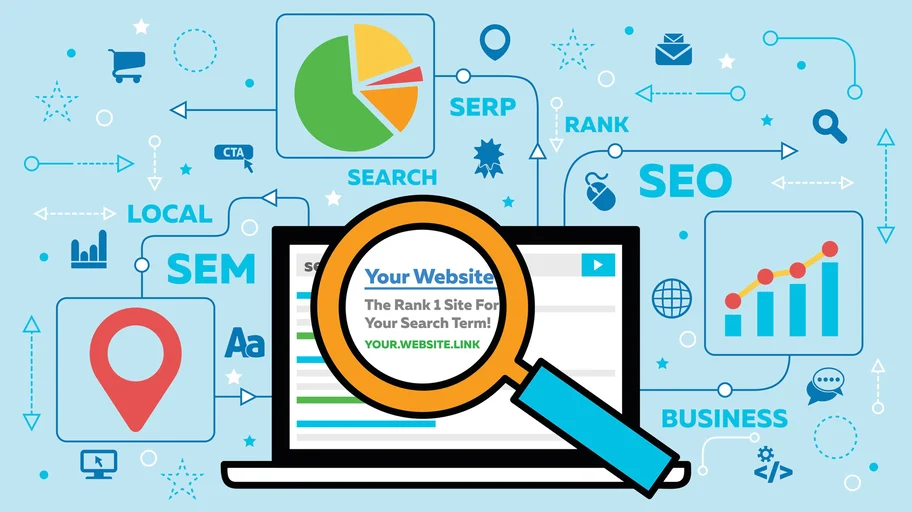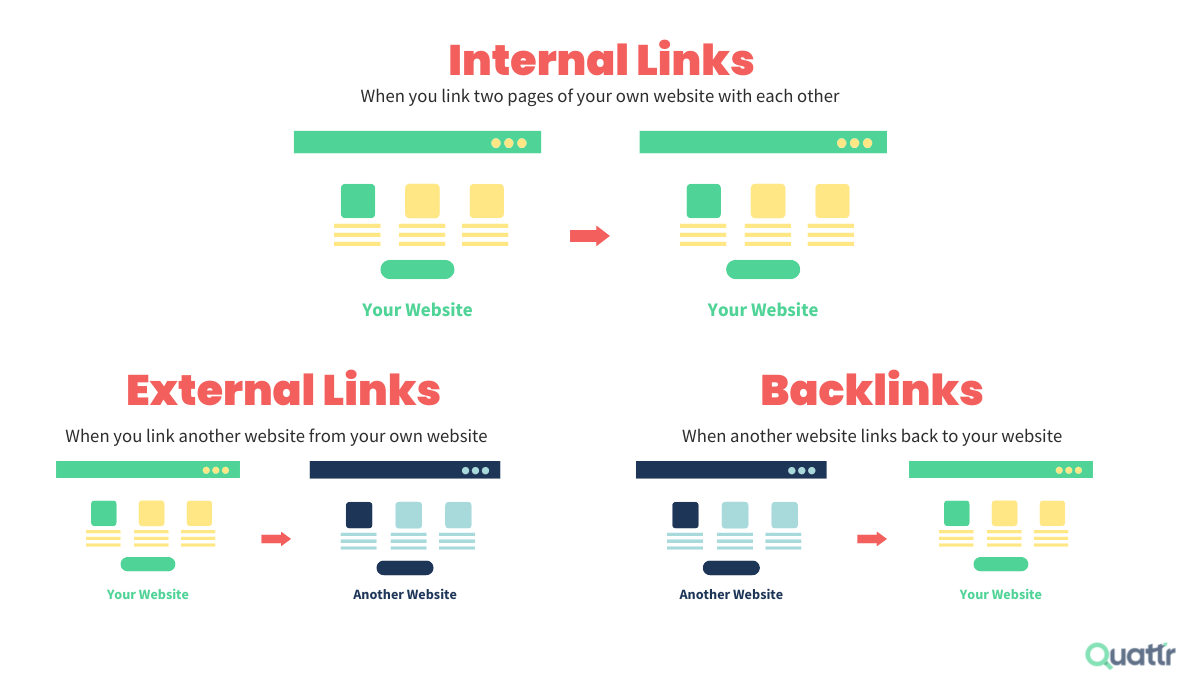How Inbound Links Strengthen Your SEO Strategy
Inbound links, often referred to as backlinks, are hyperlinks that direct users from one website to another. These links are a fundamental component of search engine optimization (SEO) because they reflect the credibility and relevance of the linked content. When a website includes an inbound link to your site, it essentially endorses your content, signaling to search engines that your website offers valuable information. This endorsement is a key factor in determining your website’s authority in the eyes of search engines such as Google.
The significance of inbound links lies in their ability to enhance your website’s visibility and improve search engine rankings. Search engines utilize complex algorithms that assess various characteristics of websites, and one critical parameter is link quality. A strong inbound link from a reputable website can contribute to higher rankings on search engine results pages (SERPs). Moreover, these links can drive direct traffic to your site, as users who click on them are likely to explore your content further, increasing engagement and potential conversions.
It is essential to distinguish between inbound links and other types of links, such as outbound links and internal links. Outbound links lead from your site to other sites, which can provide value to your readers, but they do not enhance your site’s authority. Internal links, on the other hand, are hyperlinks that connect different pages within your own website. While both types of links are essential for a comprehensive SEO strategy, inbound links are particularly crucial for establishing your site’s reputation and driving organic traffic.
The Role of Inbound Links in SEO
Inbound links, also known as backlinks, serve a critical function in search engine optimization (SEO) by acting as endorsements from one website to another. These links play a vital role in conveying the authority and trustworthiness of a website to search engines. When a reputable site links to your content, it signifies to algorithms that your content is credible and valuable, thereby enhancing your website’s ranking potential.
Link authority refers to the strength of a backlink, which can significantly impact how search engines evaluate your pages. High-quality inbound links from authoritative sources can provide a substantial boost in rankings, while links from low-quality or irrelevant websites might damage credibility. This evaluation process is largely governed by algorithms like Google’s PageRank, which assesses the number and quality of incoming links to determine a site’s overall authority. Consequently, the presence of numerous high-quality inbound links can elevate a website’s position on search engine results pages (SERPs).
Furthermore, search engines assess the context and relevance of the page providing the inbound link. If the linking website is closely related to your industry or niche, the boost in SEO performance is generally more significant. This contextual relevance plays a pivotal role in how the algorithm interprets the value of the inbound link. Thus, a strategic link-building approach focused on acquiring quality inbound links can be instrumental in bolstering your website’s authority and improving visibility in organic search.
In essence, inbound links are not merely a networking tool; they are integral to establishing online credibility and enhancing the overall performance of an SEO strategy. Their impact extends beyond mere ranking; they shape how search engines perceive the value of your website in the broader digital landscape.
How to Acquire Inbound Links
Acquiring inbound links is crucial for enhancing your website’s SEO performance, and there are several effective strategies to achieve this. One of the most recommended tactics is guest blogging. By contributing high-quality content to reputable websites in your niche, you can provide value to their audience while earning a valuable backlink to your own site. When selecting platforms for guest posts, focus on sites that resonate with your target audience and have a strong domain authority.
Another effective strategy is to create shareable content. This could be in the form of infographics, comprehensive guides, or unique research that offers insights. When content is particularly engaging or informative, it encourages others to link back to it as a resource. Make sure to promote this content through various channels to maximize visibility and enhance the likelihood of earning inbound links.
Outreach methods are also significant in your link-building efforts. Identifying influencers and key figures in your industry can yield fruitful relationships. Craft personalized emails expressing admiration for their work and suggesting relevant collaboration opportunities. This could lead to organic backlinks as they may find your content beneficial for their audience.

Utilizing social media platforms effectively can further boost your link-building initiatives. Sharing your content on social media not only widens its reach but also encourages sharing among users, leading to potential links from other websites that reference your work. Regularly engaging with users through comments and shares can help foster a community that is interested in linking to your content.
Ultimately, a proactive approach is required for acquiring inbound links. By implementing these strategies consistently, you can build a robust link profile that supports your overall SEO goals and drives more organic traffic to your site.
The Importance of Quality Over Quantity
In the realm of search engine optimization (SEO), the significance of inbound links cannot be overstated. However, the emphasis must be placed on the quality of these links rather than their sheer quantity. High-quality inbound links are integral to improving the search engine rankings of a website. They act as endorsements from credible sources, signaling to search engines that the content is valuable and trustworthy.
Characteristics of high-quality links include relevance, authority, and trustworthiness. A link from an authoritative website within your niche carries more weight than multiple links from low-authority sites. For instance, if a respected publisher in your industry links to your article, it not only enhances your site’s visibility but also improves its perceived credibility. Additionally, contextual relevance matters significantly; a link that is contextually relevant to your content will generally have a more positive impact on your SEO compared to an irrelevant one.
The growing concern of link farming and spamming highlights the risks associated with prioritizing quantity over quality. Engaging in link farming, where website owners agree to exchange links to artificially inflate their numbers, can lead to severe penalties from search engines. These practices are often identified as attempts to manipulate search rankings and can result in lower visibility or even de-indexing. Hence, the focus should always remain on a sustainable and ethical backlink strategy that prioritizes acquiring links from reputable sources.
As the digital landscape continues to evolve, search engines are getting increasingly sophisticated in evaluating inbound links. This evolution strongly reinforces the necessity for website owners to prioritize quality over quantity. The effects of a well-executed quality link-building strategy are profound and can enhance not only your site’s SEO success but its overall online reputation.
SEO-Optimized Content for Effective Link Building
Creating SEO-optimized content is a critical step in effective link building. The quality and relevance of your content can significantly influence its ability to attract inbound links from other websites. The foundation of this process is choosing the right keywords. Begin by conducting thorough keyword research to identify terms that are relevant to your topic and are commonly searched for by your target audience. Incorporating these keywords naturally into your content will enhance its visibility in search engine results while still providing value to your readers.
Structuring your content effectively is another key factor in its success. Utilize subheadings to break your article into digestible sections, which aids both search engines and users in navigating your content. Subheadings not only improve readability but also create opportunities to include variations of your primary keywords, thereby targeting a broader range of search queries. While crafting each section, ensure that your writing remains informative and engaging to hold the reader’s attention throughout the entirety of the article.
Compelling and informative articles are more likely to be linked to by other websites, as they provide valuable insights or solutions to the audience’s queries. To create such content, focus on delivering unique perspectives, backed by research or examples. Consider adding data, case studies, or visual aids like infographics that can enhance the understanding of complex topics. Moreover, fostering a strong narrative can relate your content to the reader’s experiences, thereby compelling them to share your work or link back to it. The essence of link building through SEO-optimized content lies in the quality and relevance it provides, ensuring that your site garners attention from both users and search engines alike.
Tracking and Analysis of Inbound Links
Tracking and analyzing inbound links is crucial for optimizing your website’s search engine optimization (SEO) strategy. Inbound links, which are hyperlinks directed towards your website from other sources, play a significant role in enhancing your online visibility and driving organic traffic. Therefore, employing the right tools and methods for monitoring these links is essential.
One of the most effective tools for tracking inbound links is Google Search Console. This platform provides valuable insights into your website’s backlinks, including the number of inbound links, the quality of linking domains, and the anchor text used. Utilizing these insights, you can analyze your link profile, which helps in identifying potentially harmful links that could negatively impact your site’s authority and ranking.
Additionally, third-party tools such as Ahrefs, Moz, and SEMrush offer comprehensive features for link tracking. These tools not only display the volume and quality of inbound links but also assess their impact on your SEO health. This information is vital as it allows you to monitor the health of your inbound links continuously. Regular audits of your link profile will reveal opportunities for improvement in your link-building strategy.
Another critical aspect of link analysis is performance assessment. Tracking metrics such as referral traffic, conversion rates, and keyword rankings associated with inbound links can provide valuable insights into your SEO effectiveness. This assessment allows you to identify which links are driving meaningful traffic and engagement, enabling the optimization of your link-building efforts.
In conclusion, effective tracking and analysis of inbound links is integral to a successful SEO strategy. By leveraging various tools and assessing the performance of your inbound links, you can refine your approach, improve your link profile, and ultimately enhance your website’s search visibility.
Common Misconceptions about Inbound Links
Inbound links, often regarded as crucial elements of search engine optimization (SEO), are subject to numerous misconceptions that can misguide marketers and website owners. One prevalent myth is the belief that all links are beneficial for a website’s performance. This misunderstanding can lead to poor link-building strategies, as some may pursue any available link opportunity without evaluating the quality of the linking site. In reality, inbound links from reputable and relevant sources contribute significantly to SEO. Conversely, links from low-quality sites may harm a site’s ranking and lead to penalties from search engines, thereby underscoring the necessity of focusing on quality over quantity when acquiring inbound links.
Another common misconception is that inbound links are a one-time effort. Some website owners mistakenly assume that once they have created a few high-quality inbound links, they can relax their SEO efforts and expect sustained benefits. This is
not the case, as SEO is an ongoing process that requires continuous effort and adaptation to search engine algorithms and competitive landscapes. Inbound links should be regularly monitored and updated to ensure they remain relevant and beneficial. Websites need to cultivate new inbound links consistently, engage with their audience, and keep content fresh to maintain and improve their search rankings.
Furthermore, there is a belief that only links from highly authoritative sites are worthwhile. While links from such websites certainly have significant impact, links from smaller, niche-specific sites can also drive valuable traffic. These links often come from highly engaged audiences who may have a genuine interest in the content being linked. Hence, it is vital to recognize the various types of inbound links and their potential value within a broader SEO strategy.
Future Trends in Inbound Linking and SEO
The landscape of inbound linking and search engine optimization (SEO) is constantly evolving. As search engines refine their algorithms, the implications for inbound links are becoming increasingly pronounced. One notable trend is the growing emphasis on context and relevance in inbound linking. Search engines are shifting focus from mere quantitative metrics, such as the number of links, to qualitative aspects that consider the contextual relevance of a link to the content it is associated with. This change compels website owners to prioritize high-quality, relevant backlinks over a broader, less targeted linking strategy.
Alongside the traditional SEO strategies, the influence of social media on inbound links is becoming more significant. As platforms like Twitter, Facebook, and LinkedIn gain prominence, the sharing of content through these channels generates valuable inbound links. A well-crafted social media strategy not only enhances visibility and audience engagement but also contributes to a website’s link-building efforts. Moreover, user-generated content on social media platforms increasingly serves as a source of inbound links, making it essential for brands to foster community interaction and leverage their social presence.
User experience (UX) is also emerging as a critical factor in SEO. Search engines are increasingly rewarding websites that offer a user-friendly experience, which includes intuitive navigation, fast load times, and mobile optimization. These factors influence how visitors interact with a site, which can, in turn, affect the likelihood of obtaining valuable inbound links. A website that delivers a superior user experience is more likely to attract inbound links as other content creators and businesses seek to refer their audiences to a trustworthy source. As we move forward, the integration of effective UX principles into inbound linking strategies will be paramount for sustained SEO success.
Frequently Asked Questions (FAQs)
Inbound links, often referred to as backlinks, play a fundamental role in establishing the credibility and authority of a website within search engine optimization (SEO). Below, we address some of the most common questions regarding inbound links and their significance in digital marketing.
What is the best way to create high-quality links?
Creating high-quality inbound links requires a strategic approach. First and foremost, producing valuable and shareable content is essential. Content that serves the audience’s needs tends to attract more backlinks naturally. Engaging in guest blogging is another effective method, as it allows you to contribute to other reputable websites while earning backlinks to your own. Outreach efforts are also crucial; identifying relevant sites within your niche and requesting links can yield positive results if done tactfully. Additionally, consider leveraging social media platforms to promote your content and boost visibility, leading to higher chances of obtaining quality backlinks.
How do inbound links affect SEO rankings?
Inbound links are a critical ranking factor for search engines. They signal to search engines that other reputable websites validate your content. Generally, the more high-quality backlinks pointing to your site, the higher your chances of achieving better rankings in search engine results pages (SERPs). However, not all backlinks carry equal weight; links from authoritative and relevant sites are more beneficial than those from lesser-known or unrelated domains. It is also important to note that the anchor text used in the inbound links can influence how search engines perceive the content on your site.
How can I monitor my backlink profile?
Monitoring your backlink profile is essential in ensuring the effectiveness of your SEO strategy. SEO tools such as Google Search Console, Ahrefs, or Moz can provide insights into your inbound link profile, allowing you to track the quantity, quality, and sources of your backlinks. Regular assessment helps identify any detrimental links that may harm your website’s ranking and can prompt necessary actions to maintain a healthy backlink profile.
These FAQs highlight the essential aspects of inbound links and their impact on SEO. As you continue to develop your SEO strategy, understanding the role of backlinks will empower you to enhance your online presence effectively.




Leave a Comment